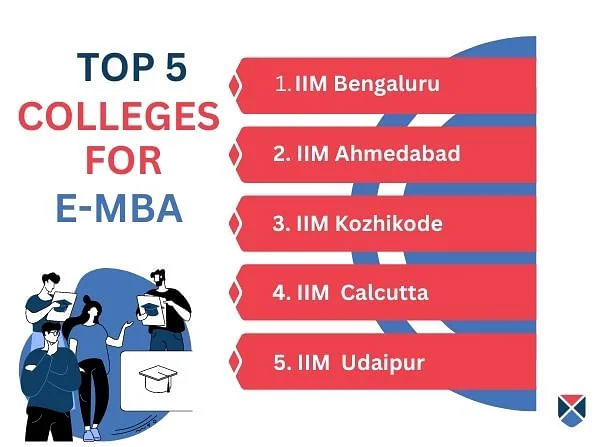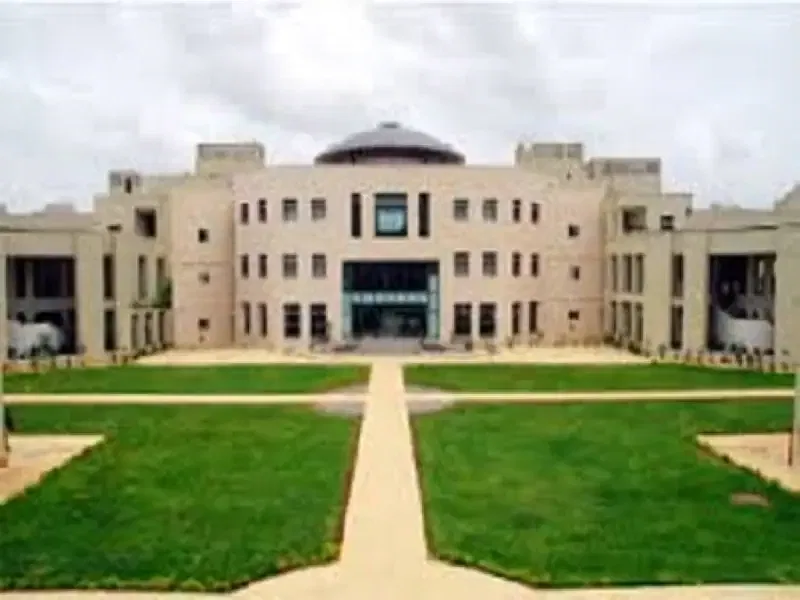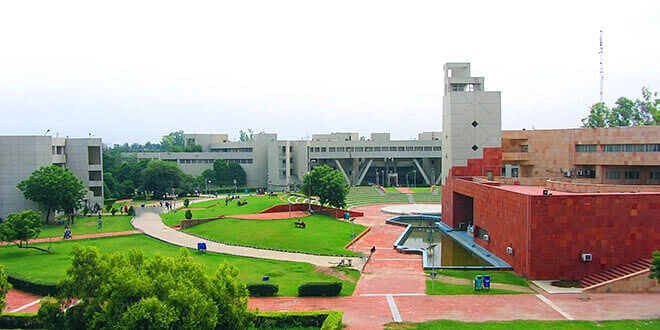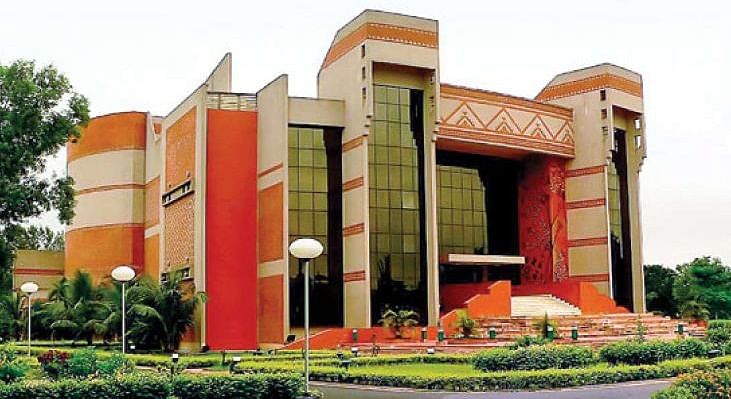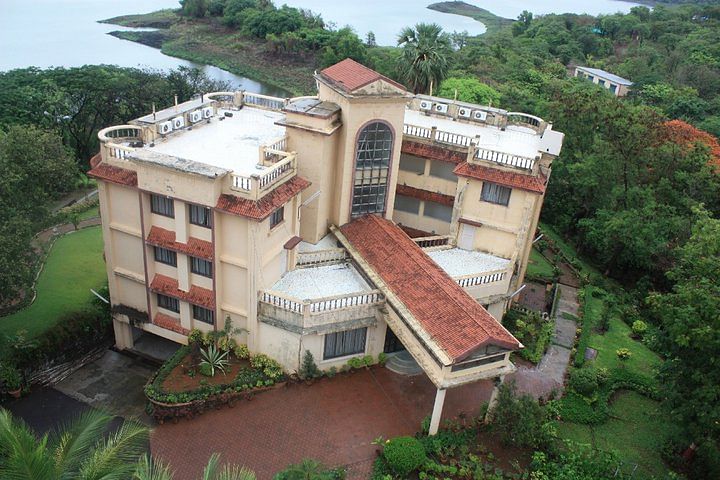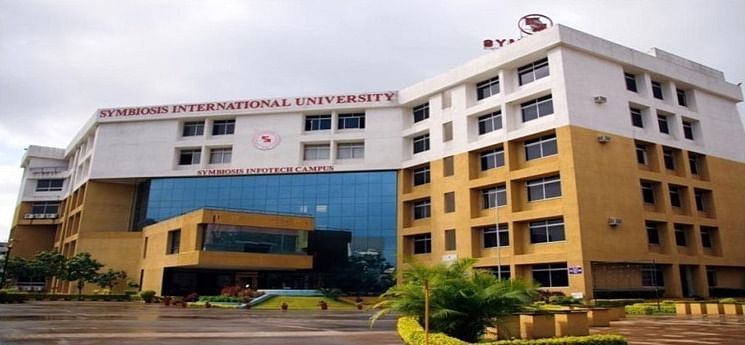Executive MBA: Course Details, Admission, Eligibility, Fees

An Executive MBA, usually referred to as an Executive MBA for working professionals, is a 2 year specialized MBA program developed for working professionals who want to improve their leadership skills and grow their careers while still working. Unlike standard MBA programs, which frequently require full-time study, the Executive MBA in India provides flexible scheduling, including weekend or evening classes, to accommodate the demands of a demanding professional life.
The Executive MBA program in India is suitable for mid to senior-level managers and professionals who want to broaden their professional networks, improve their business acumen, and raise their chances of career advancement.
Human Resources, Operations, Sales & Marketing, and Finance are among the Executive MBA subjects offered. Executive MBA programs give students the information, leadership, and analytical abilities they need to advance their careers. Executive MBA eligibility needs a degree in any field and 3 - 5 years of relevant work experience, depending on the college/university.
Executive MBA Admission requires candidates to clear a bachelor's degree with a minimum of 50% marks for unreserved category students and 45% marks for reserved category students. The candidate should also qualify for entrance exams such as CAT, XAT, GMAT, MAT, etc., along with having full-time work experience of 3-4 years. The average Executive MBA course fee is INR 8 Lakh- INR 30 Lakh.
Table of Contents
- What is Executive MBA?
- Executive MBA Eligibility Criteria
- Why Choose Executive MBA?
- Executive MBA Admission 2024
- Executive MBA Entrance Exam
- EMBA 2024 Cut Off Details
- Executive MBA Specializations
- Top Executive MBA Colleges in India With Fees
- Types Of Executive MBA Courses
- Executive MBA Syllabus and Subjects
- Executive MBA Comparison
- Courses After Executive MBA
- Executive MBA Average Salary in India
- Career Options After Executive MBA
- Executive MBA Top Recruiters
- Industries Targeting Executive MBA Graduates
- Executive MBA Course Objectives
- Skills to Excel in MBA Executive
Executive MBA Course Details
| Degree | Masters |
| Full Form | Executive Master of Business Administration |
| Duration | 1 Year |
| Age | No specific age limit |
| Entrance Exam | CAT, MAT, XAT, CMAT, GMAT, NMAT |
| Subjects Required | An honors or a graduate degree recognized by UGC |
| Minimum Percentage | A minimum of 50% marks in Bachelor's degree |
| Average Fees | ₹8 - 10 L |
| Similar Options of Study | MBA, Distance MBA |
| Average Salary | INR 10 - 30 LPA |
| Employment Roles | Operations Manager, Project Manager, Senior Business Analyst, Finance Manager, Senior Accountant, Senior Financial Analyst, etc. |
| Top Recruiters | TCS, Infosys, Wipro, HDFC, Microsoft, Bosh, TATA Consultancy, Google, etc |
What is Executive MBA?
EMBA full form is Executive Master of Business Administration. The Executive MBA from IIMs provides more research opportunities for professionals to upskill their managerial skills through chosen domains of specialization like Marketing, Finance, HR, Operations Management, etc.
The Executive MBA program is career-oriented and produces more entrepreneurs in various domains. The Executive MBA job scope covers extensive roles ranging from finance manager, accountant, personal banker, etc. The average salary of an Executive MBA graduate is INR 10-30 LPA (Source: Payscale).
Executive MBA Eligibility Criteria
Students pursuing an Executive MBA are more likely to advance in their careers than those who do not. The eligibility requirements for an Executive MBA are comparable to those for a regular MBA. The sole difference in Executive MBA eligibility is job experience, which is highly valued during the selection process.
Check out the Executive MBA eligibility requirements below:
- Any candidate who has earned a bachelor's degree with a minimum aggregate of 50% or equivalent from a recognized university. Many institutes have no minimum cut-off scores for Executive MBA eligibility.
- The candidate must pass the entrance exam before proceeding to the final step of selection, which includes the GD and PI rounds.
- The candidate must have two years of managerial or executive experience. None of the MBA institutes accept part-time work experience.
- The amount of working years required for Executive MBA eligibility varies by institute, ranging from two to five years. Before applying, the candidate should check the Executive MBA eligibility of their favourite B-schools.
Why Choose Executive MBA?
An Executive MBA degree builds better management skills for students in finance, marketing, accounting, etc., in detail and according to industry requirements. Below are some reasons why students should pursue an Executive MBA course.
- The Business market in India is projected to grow by 11.45% (2022-2027) resulting in a market volume of US$59.51m in 2027.
- As of 2022, 80,152 startups have been officially recognized in India.
- Students can expect lucrative job offers in some top companies like Amazon, Wipro, Deloitte, etc. They can get better jumps in salaries along with promotions.
- They can develop various managerial skills, leadership skills, communication skills, etc., through working on globally demanding projects.
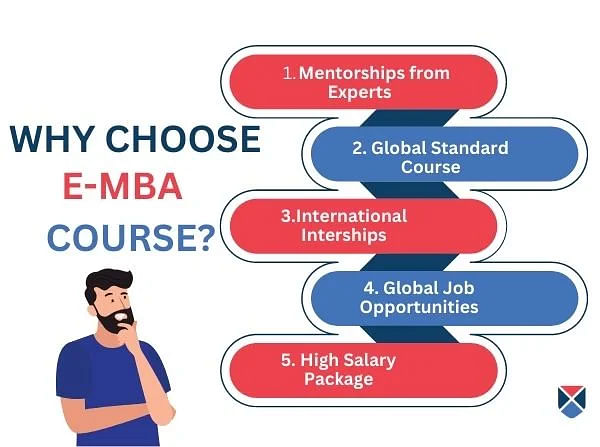
Also Read: Top 12 Benefits of Executive MBA Program
Executive MBA Admission 2024
Students can seek admission into top Executive MBA colleges in India based on entrance exams such as CAT, MAT, etc. Elucidated below is the Executive MBA admission process in several colleges:
- There is an option for students to either apply online through the university website or apply offline by visiting the college.
- Students should fill out the course admission form once the notification is released.
- Most IIMs consider GMAT for executive MBA. A 750 and above score on GMAT is considered to be good. CAT is accepted by some IIMs like IIM Kozhikode, IIM Shillong, IIM Rohtak, etc.
- Some IIMs like IIM Bangalore and IIM Udaipur will have a separate language test. WAT is conducted to know more about candidates' future career goals.
- After completion of the exam, results will be put up on the website.
- Colleges may finally conduct GD/PI to finalize the selection process.
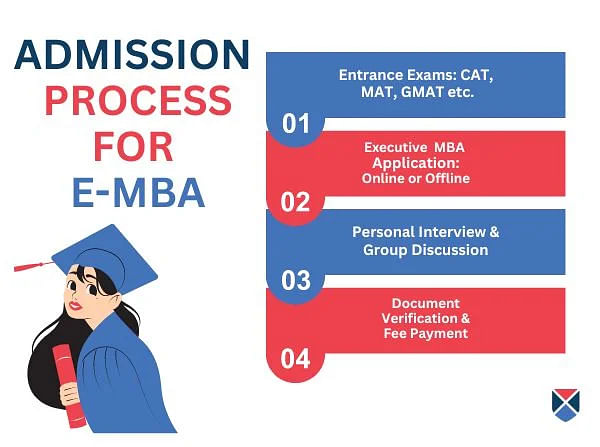
Executive MBA Entrance Exam
Students who want to pursue an Executive MBA in India have to clear the respective entrance examinations like CAT, MAT XAT, NMAT, etc. to get admission. There are various national entrance exams that students can opt for. Here is the list of some of the common popular entrance exams for Executive MBA:
|
Exam Name |
Exam Dates |
|
CAT |
Nov 24, 2024 |
|
MAT 2024 CBT 1 - 7 Dec 2024 MAT 2024 PBT - 14 Dec, 2024 MAT 2024 CBT 2 - 22 Dec 2024 |
|
|
XAT |
Jan 5, 2025 |
|
Nov 5 - Dec 20, 2024 |
|
|
SNAP 2024 session 1 - 8 Dec, 2024 SNAP 2024 session 2 - 15 Dec, 2024 SNAP 2024 session 3 - 21 Dec, 2024 |
|
|
May 25, 2025 (Tentative) |
Also Read: Steps to Build Your Profile for Admission to Top MBA Colleges in India
EMBA 2024 Cut Off Details
One must note that the Executive MBA cut off marks are decided in percentile every year. Thus, only passing the exam does not grant admission to the candidates. The Executive MBA CAT cut off is similar to the regular CAT cutoff marks. The rough estimate of the EMBA CAT cut off marks 2024 is shared below for reference.
| Colleges | CAT Cut Off Marks 2024 (in %tile) |
| MDI Gurgaon | 94-95 |
| JBIMS Mumbai | 93+ |
| XIMB | 91 |
| IMI Delhi | 90 |
| SPJIMR | 85 |
| TAPMI | 85 |
| FMS BHU | 85 |
| IMT Nagpur | 80 |
| XIME Bangalore | 76 |
Executive MBA 2023 Cutoff Details
The Common Admission Test (CAT) is conducted at the national level in India for admission to management programs in top B-schools such as IIMs, MDI, FMS Delhi, etc. The CAT cutoff varies each year depending on the toughness of the exam, the total applications, etc.
EMBA CAT Cut off 2023
The CAT cut-off 2023 was released by various colleges after the CAT exam was conducted across India. Below is the list of the best Executive MBA colleges in India along with their 2023 CAT cut-off for general category students:
|
College Name |
CAT Cutoff 2023 (in %tile) |
|
IIM Ahmedabad |
99 |
|
IIM Calcutta |
95 |
|
IIM Lucknow |
90 |
|
IIT Kharagpur |
90 |
|
IIM Bangalore |
85 |
|
IIM Kozhikode |
85 |
|
IIM Indore |
90 |
|
IIT Delhi |
90 |
EMBA MAT Cutoff 2023
Management Admission Test or MAT is a popular entrance exam for Executive MBA admissions into well-known management schools across the country. MAT exam takes place four times in a year- February, May, August and December.
Given below are the cutoff details of the MAT exam 2023 for the general category:
|
College Name |
MAT Cutoff 2023 |
|
Xavier Institute of Management and Entrepreneurship, Bangalore |
700 |
|
PSG Institute of Management |
600 |
|
Institute of Public Enterprise, Hyderabad |
650 |
|
Balaji Institute of Modern Management |
600 |
|
Alliance University |
600 |
Executive MBA Specializations
There are various MBA Executive specializations that students can opt for as per their interest area. The most pursued specializations are HR, Finance, and Marketing. The details of the Executive MBA specialization in India are given below:
| Executive MBA Specialization | Details | Average Tuition Fees (in Lakh) | Average Salary Package (in LPA) |
| Executive MBA in HR | This is one of the most sought-after degrees in MBA that is in demand from all corporations and organizations. | 10-30 | 7.76 |
| Executive MBA in Finance | This degree is offered as a specialisation in the second year of all major MBA programs. | 5-25 | 20 |
| Executive MBA in Marketing | This course has numerous job opportunities in the sales and marketing field, whether local or international. | 8 - 30 | 10 |
| Executive MBA in Business Analytics | This course covers the basic principles of business and a deep focus on analytics. | 4-15 | 10 |
| Executive MBA in IT | This course provides a thorough understanding of security, e-commerce, and human resource management. | 4-15 | 20 |
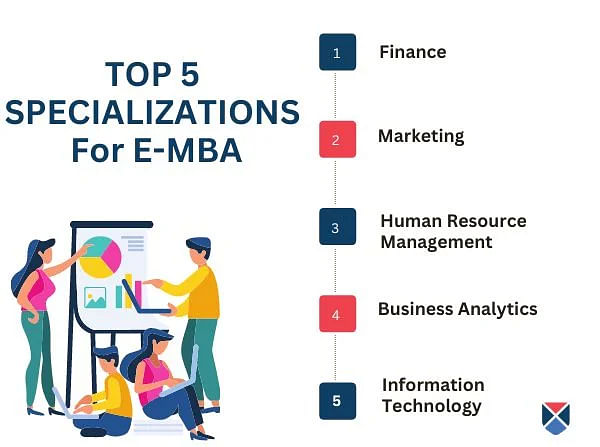
Top Executive MBA Colleges in India With Fees
The Executive MBA in India can be pursued from top government colleges like IIM Ahmedabad, FMS Delhi, etc., and various private colleges like SP Jain School of Global Management, Christ University, etc. The total fee for an Executive MBA in India ranges from INR 8-30 Lakhs.
The top colleges offering EMBA courses along with their average fees are given below:
Executive MBA from IIMs
Executive MBA in IIMs is a bit high investment, but the ROI is also good. Pursuing this course in IIMs will be a great experience as candidates will be surrounded by some of the best faculties and will be able to build a good network of peers.
The table below contains the various IIMs offering MBA Executive programmes along with fee details:
|
NIRF Rankings 2024 |
Colleges |
Type of EMBA Course Offered |
Executive MBA Fee |
|
1 |
PGPX, ePGP |
INR 28 Lakh |
|
|
2 |
PGPX, PGPEM |
INR 23 Lakh |
|
|
3 |
PGP-BL |
INR 23 Lakh |
|
|
4 |
PGPEX-VLM |
INR 31 Lakh |
|
|
7 |
PGPWE |
INR 23.50 Lakh |
|
|
22 |
PGPX(SCM) |
INR 20 Lakh |
IIM Ahmedabad Executive MBA
Executive MBA from IIM Ahmedabad is one of the top courses for students to pursue. Given below in the tables are the details of the Executive Management program at IIM Ahmedabad:
|
Eligibility |
Bachelor's degree of minimum 3 years duration with at least 50% marks (45% in case of candidates belonging to the reserved category) + Entrance exams like CAT, GMAT, etc |
|
EMBA Duration |
1-year |
|
EMBA courses fees |
INR 28 Lakh |
Read More: IIM Ahmedabad Executive MBA
IIM Bangalore Executive MBA
The Executive MBA course at IIM Bangalore is one of the most preferred courses by many working professionals for its job-oriented curriculum. Given below are the course details:
|
Eligibility |
Bachelor's degree of minimum 3 years duration with at least 50% marks (45% in case of candidates belonging to the reserved category) + Entrance exams like CAT, GMAT + Work Experience of 5 years |
|
EMBA Duration |
1-year |
|
EMBA courses fees |
INR 42 Lakh |
Read More: IIM Bangalore EMBA
IIM Kozhikode Executive MBA
The Executive MBA program at IIM Kozhikode is for those candidates who wish to learn management principles in depth through case studies and examples. The course details are provided below in the tables:
|
Eligibility |
Bachelor's degree of minimum 3 years duration with at least 50% marks (45% in case of candidates belonging to the reserved category) + Entrance exams like CAT, GMAT, etc + 5 years of Work Experience |
|
EMBA Duration |
1 year |
|
EMBA courses fees |
INR 28 Lakh |
Read More: IIM Kozhikode Executive MBA
Top Private Executive MBA Colleges in India
The average total EMBA fees at private colleges are in the range of INR 3-14 Lakhs. The table below contains the best private EMBA colleges in India along with their average fees:
| NIRF Ranking 2024 | College | Average Total Fees (INR in Lakhs) |
| 5 | ISBR Bangalore | 3.25 |
| 13 | Symbiosis Institute of Management Studies | 3.3 |
| 20 | SP Jain School of Global Management | 14.4 |
| 35 | IMT Ghaziabad | 19.2 |
| 40 | IBS Hyderabad | 5.20 |
| 63 | DY Patil University | 7.50 |
| 65 | Jain University | 10.80 |
| 90 | Christ University | 4.65 |
| 101+ | PES University | 5.50 |
Types Of Executive MBA Courses
Executive MBA is meant for working professionals. Different types of Executive MBA courses along with their duration is given below:
|
Type |
Eligibility for EMBA Courses |
EMBA Duration (in years) |
|
Executive MBA Full Time |
Candidate should have completed bachelor's degree with a minimum of 50-55% marks + Entrance Exam |
1 |
|
Weekend Executive MBA |
Candidate should have completed a bachelor's degree with a minimum of 50-55% marks |
1.5 |
|
Online Executive MBA |
Candidate should have completed a bachelor's degree with a minimum of 45-50% marks |
1.5-2 |
|
Distance Executive MBA |
Candidate should have completed a bachelor's degree with a minimum of 50% marks |
1-2 |
Online Executive MBA Courses
EMBA courses can be done in online mode. It caters to working professionals who do not wish to leave their jobs. Below listed are some pointers regarding online EMBA:
- Many MBA Abroad colleges offer online MBA Courses such as universities like XIBMS, SP Jain School of Global Management, etc.
- The duration of this course is about 15-20 months.
- The Executive MBA eligibility for online MBA Programs is a GPA score of around 3.0 out of 4.0 and a GMAT score of 550 or more.
Weekend Executive MBA Courses
Weekend Executive MBAs have become easy for students who do not wish to leave their jobs but wish to get an MBA degree. Below listed are some important pointers regarding the weekend Executive MBA course:
- Colleges like ISB, PES University, etc., provide Weekend Executive MBA courses.
- It requires 3 years of work experience and the duration is 18 months.
- The average course fee is between INR 50,000-3 Lakh.
Distance EMBA Course Details
Distance Executive MBA is an ideal option for students who cannot attend a full-time course at the respective college. Below mentioned are the EMBA distance education course details:
- The duration of a Distance Executive MBA is 1-2 years.
- There is no upper age limit to enrol in the course.
- A distance MBA Executive course can be pursued from prominent colleges like IGNOU, IMT Ghaziabad, Symbiosis Centre for Distance Learning, etc, in various specializations.
- The average distance Executive MBA course fee is in the range of INR 20,000 - 2 Lakhs.
Also Read: Top 10 Skills Required for MBA Students to Succeed
Executive MBA Syllabus and Subjects
EMBA course is especially for working professionals who want to gain expertise in management subjects like marketing, finance, accounting, etc. The students will study in-depth core corporate-level strategies to develop a business and hone managerial skills to take up leadership roles.
The important Executive MBA subjects are explained below:
| Subjects | Topics Covered |
| Management Concepts and Organisational Behavior | Evolution of management thought, Formal and informal organizations, Managing Individual Behavior, Group Dynamics & Team Management, etc |
| Managerial Economics | Nature and scope of Managerial Economics, Utility analysis; Indifference curves analysis, Production Analysis, Characteristics of different market structures, etc |
| Accounting for Managers | Basic accounting concepts, preparation of journal, Rectification of errors, profit and loss account, Cash flow analysis, Conceptual understanding of Cost Accounting, etc |
| Marketing Management | Concept of the marketing mix, Product Concepts and Pricing, Promotion and Channel decisions, Emerging trends and issues in marketing, etc |
| Financial Management | Meaning and Approaches to Finance Function, Meaning, Cost Theory and Earning Theory of Capitalization, Dividend Policy, Working Capital Management, etc |
| Strategic Management | Introduction to Strategy and Strategic Management, Process of Strategic Management, Corporate Level Strategies, Implementation of Strategy, etc |
Read More: Executive MBA Syllabus and Subjects
Executive MBA Comparison
The course of MBA executive has been designed keeping the working professionals in mind. The EMBA degree is suitable for candidates who want to balance their work and MBA degree in a loop. Here is a comparison of EMBA with other related degrees.
EMBA vs MBA
Executive MBA is exclusively meant for working professionals who wish to upscale their management skills and seek better job profiles in a company, while MBA offers various specialisations for students who have completed their graduation.
The table lists the basic differences between MBA and Executive MBA course structures and curricula.
|
Parameter |
Executive MBA |
MBA |
|
Full-Form |
Executive Master of Business Administration |
Master of Business Administration |
|
Discipline |
Management |
Management |
|
Course Duration |
1 year |
2 years |
|
Course Objective |
The course focuses on the career advancement of individuals by imparting advanced strategic skills for senior management positions. |
It gives a comprehensive education in business and management concepts and enhances their leadership and critical thinking skills. |
|
Average Fees |
INR 8-30 Lakh |
INR 3-15 Lakh |
|
Average Salary |
INR 10-30 LPA |
INR 5-9 LPA |
|
Work Experience |
5-10 years |
No work experience is required |
|
Top Institutes |
IIM Ahmedabad, IIM Bangalore, FMS New Delhi, ISB Hyderabad, etc |
All IIMs, XLRI, SIBM, ISB, etc |
Read More: EMBA vs MBA
Executive MBA vs Distance MBA
Executive MBA follows a rigorous curriculum for working employees and is offered both on campus and through online mode. Distance MBA is for students who wish to complete the course from the comfort of their homes. Given are some important differences between the two courses:
|
Parameter |
Executive MBA |
Distance MBA |
|
Full Form |
Executive Master of Business Administration |
Distance Master of Business Administration |
|
Course Duration |
1 year |
2 years |
|
Average Fees |
INR 8-30 Lakh |
INR 20,000 - 2 Lakh |
|
Average Salary |
INR 10-30 LPA |
INR 5-10 LPA |
|
Work Experience |
5-10 years |
No work experience is required |
|
Course Offerings |
This course provides expert knowledge to professionals who wish to enhance their knowledge. |
The course gives in-depth insights into management principles and business functioning from the comfort of a student's home. |
|
Top Institutes |
IIM Ahmedabad, IIM Bangalore, FMS New Delhi, ISB Hyderabad, etc |
DUSOL, IGNOU, LPU, UPES, Manipal University, etc |
Also Check: Distance MBA Course
Executive MBA vs Part-Time MBA
A part-time degree in Management of Business Administration would be suitable who are handling multiple works altogether. This shall prove to be helpful to candidates who are mid-way professionals and want to add a feather to their cap.
|
Parameter |
Executive MBA |
Part-Time MBA |
|
Full Form |
Executive Master of Business Administration |
Part-Time Master of Business Administration |
|
Course Duration |
1 year |
2-3 years |
|
Average Fees |
INR 8 Lakh - 30 Lakh |
INR 60,000 - 8,00,000 |
|
Average Salary |
INR 10-30 LPA |
INR 5-25 LPA |
|
Work Experience |
5-10 years |
No work experience is required |
|
Course Offerings |
This course provides expert knowledge to professionals who wish to enhance their knowledge. |
The course gives in-depth insights into management principles and business functioning from the comfort of a student's home. |
|
Top Institutes |
IIM Ahmedabad, IIM Bangalore, FMS New Delhi, ISB Hyderabad, etc |
NMIMS School of Business Management, SIBM, IIM Raipur, etc |
Courses After Executive MBA
After completing the Executive MBA program, aspirants can pursue various higher education and certification courses to improve their domain expertise and knowledge. Below is a list of courses that EMBA graduates can pursue:
- Ph.D in Management
- Chartered Financial Analyst
- Doctor of Business Administration
- ISB's Certificate Programme in Business Analytics
Executive MBA Average Salary in India
The Executive MBA degree salary may vary based on experience and skills. The average entry-level salary range for an Executive MBA in India ranges from INR 10-18 LPA. After gaining 3-5 years of work experience professionals can earn in the range of INR 20-30 LPA (Source: Payscale).
Some of the top cities for Executive MBA graduates to look for jobs are:
| Top Cities | Average Entry-Level Salary (INR) |
| Bangalore | 18 LPA |
| Mumbai | 17 LPA |
| Delhi | 16 LPA |
| Pune | 16 LPA |
| Gurgaon | 13.6 LPA |
Career Options After Executive MBA
Executive MBA graduates can enjoy an average salary hike of around 17% within two years of completing the course. EMBA career opportunities are abundant and some of the job roles along with hiring companies and salaries are listed below:
| Job Designation | Job Description | Average Salary (INR) |
| Business Development Manager |
|
7 LPA - 11 LPA |
| Technical Operations Manager |
|
7 LPA - 30.3 LPA |
| Senior Marketing Manager |
|
10 LPA - 30 LPA |
| Operations Manager |
|
8 LPA - 19 LPA |
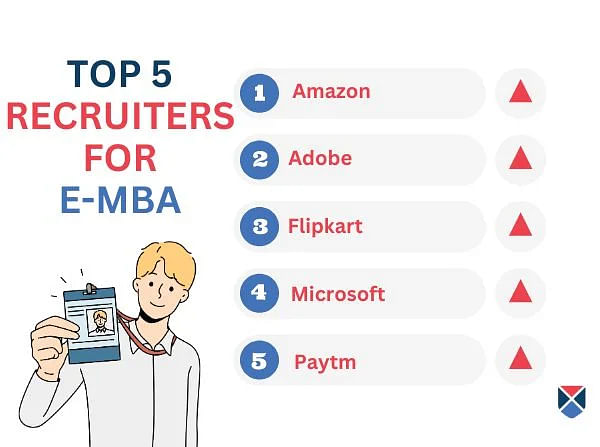
Read More: Executive MBA Jobs & Scope in India
Executive MBA Top Recruiters
The demand for an Executive MBA degree is increasing. Graduates of executive MBA programs at IIMs and other top B-Schools earn an average of INR 13 lakh per year or more. Executive MBA degree holders are best suited for top management positions and entrepreneurship. Companies and business houses hire such candidates for senior management positions in fields such as finance, marketing, sales, human resources, information technology, digital marketing, business analysis, operations, banking, insurance, and consulting.
Some of the companies that participate in the campus placement process to hire Executive MBAs are listed below.
- HCL
- Infosys
- Vedanta
- Trident Group
- Grey Orange
- KPMG
- Reliance Industries
- Larsen & Toubro (L&T)
- Cadbury
- Hindustan Unilever (HLL)
Also Read: How to Balance Job and MBA Alltogether?
Industries Targeting Executive MBA Graduates
Businesses are on the lookout for employees with EMBA degrees. An EMBA enables you to start your firm because the curriculum includes business management disciplines. The following industries have a greater rate of growth for those pursuing an Executive MBA:
1. Finance: An EMBA is an excellent career path for those who aspire to be pioneers in the field of finance. With an EMBA in Finance, you may learn all of the necessary skills while also improving your existing ones. A strong finance department is critical to every business, and careers in this field include financial analysis, investment banking, and risk management.
2. Human Resources: An EMBA helps employees get a better understanding of management, while the human resources department ensures that personnel are properly used through the employment of appropriate management strategies. A corporation's human resources department is responsibility for employing people, providing appropriate training, building a company culture, and so on.
3. Marketing: An EMBA can teach you everything you need to know about business, and marketing is an essential component of any organisation. Individuals can profit from an EMBA in Marketing by learning the principles of marketing and acquiring expertise in areas such as raising product awareness in the market and influencing purchase decisions.
4. Sales: To thrive in the market, a company's revenue generation is based on sales. Sales are important to a country's success. An EMBA in Sales can help individuals pursue a range of fascinating employment opportunities.
5. E-commerce: It is the sale and purchase of goods and services via the Internet. Transactions can occur between businesses, customers, consumers, or both. An EMBA with an E-commerce emphasis can lead to a variety of professional prospects, including Business Analyst, Supply Chain Management, Customer Relations Manager, and more.
Also Read: Private or Government College? Which is Best for MBA?
Executive MBA Course Objectives
There are several objectives fulfilled by the Executive MBA program. Any candidate opting for the EMBA course may excel in the following domain:
- Leadership Quality- The overall design of the course is in a way to boost the candidate's confidence, enhance personality, and motivate them towards leading a team with excellence.
- Financial Management- This factor is an important skill to be inculcated within all. It provides key skills in corporate finance and stakeholder values.
- Strategic Management- The program helps candidates cover long-term planning, work on policies, implement corporate strategies, and analyse upcoming pros and cons.
- Adds to Innovativeness- The continuous contact with different-minded people helps people perceive others and get more innovative and creative towards any project.
Skills to Excel in MBA Executive
To shine as an Executive MBA graduate, various skills should be inculcated in the ongoing learning environment that will help students improve their learning curves and develop a practical approach to solving problems. Listed below are some essential skills.
- Employee Development: A good manager should focus on developing his team members through various opportunities in a company.
- Strategic Thinking: Students should be aware of various long-term and short-term strategies to improve the growth of the business.
- Senior Leadership Skills: A team leader should influence his team through his hard work and dedication towards fulfilling the company’s objectives.
- Management Skills: Planning, Controlling, Organising, and Leading are the main 4 principles for working professionals to follow.
- Communication and Interpersonal Skills: They should build relevant contacts and maintain healthy employee relationships.
Also Read: Highest Paying MBA Specializations in India
Top Executive MBA Colleges
Top Management Entrance Exams
Executive MBA Fee Structure
FAQs on Executive MBA
Q: What is the placement record for an executive MBA?
Executive MBA students, who already have work experience, require industry training. Rather, the class draws on the students' different job experiences through a variety of talks, case studies, and other activities. After completing the Executive MBA program, graduates will have a wide range of job opportunities. The important abilities obtained in this curriculum will also assist students in broadening their reach and entering different industries. Recruiters are continuously looking for candidates who have the right balance of academic knowledge and industrial experience.
Q: Can I do my job with Executive MBA?
Yes, you can, although it differs for each business school. There are alternatives for part-time and full-time executive MBAs. Part-time MBA studies are conducted on weekends. So, you can continue working while doing an executive MBA, but make sure that the B-School you choose offers part-time executive MBA programs.
Q: What does an Executive MBA graduate do?
An Executive Master of Business Administration (EMBA) is a graduate-level business degree program developed for experienced professionals who wish to improve their leadership and management abilities while still working full-time. An EMBA helps executives and seasoned professionals improve their strategic thinking, leadership, and management skills, allowing them to make better decisions in their employment. It also provides opportunities for personal and professional development, greater leadership skills, and expanded career options.
Q: Which one is better Executive MBA or Distance MBA?
Executive MBA is a course designed for candidates who work full-time while earning an MBA, referring to them as 'working executives'. It is a part-time, evening, distance-learning, or online curriculum designed for individuals with 6 to 13 years of expertise. IIMs offer good executive programs, albeit they are not equivalent to ordinary MBAs. It provides a high ROI for both the firm and the person. If you have fewer than three to four years of experience in your field, consider pursuing a Distance MBA to gain management skills that will help you advance your current possibilities.
Q: Is an Executive MBA from IIM Calcutta worth it?
According to the NIRF rankings, IIM Kolkata is among the country's top five management institutes. It has been placed fourth. The institute helps Executive MBA students get jobs. Many prominent recruiters from many sectors, including information technology, manufacturing, telecommunications, and banking, participate in its placement effort. According to previous years' records, some of the top recruiters who made offers during IIM Calcutta Executive MBA placements included EY GDS, Infosys, HSBC, Accenture, and BCG.
Q: How syllabus of an Executive MBA programme syllabus differ from a regular MBA?
The Executive MBA's course material and syllabus are similar to those of the two-year Regular MBA. The basic disciplines remain the same, but the total course content or curriculum is structured in a more advanced manner to meet the knowledge needs of Executives, who are at the mid-senior level of an organizational hierarchy. The speed of class delivery is also faster because the course lasts a year. There are fewer electives for Executive MBA students, and the teaching style is more involved.
Q: What is the age limit to pursue an Executive MBA?
An executive MBA program requires a candidate to be at least 25-27 years old. However, the age limit for an Executive Master of Business Administration (EMBA) curriculum in India varies each business school. Unlike standard full-time MBA programs, EMBA programs are primarily designed for experienced professionals in mid- to senior-level management jobs, with several years of work experience.
